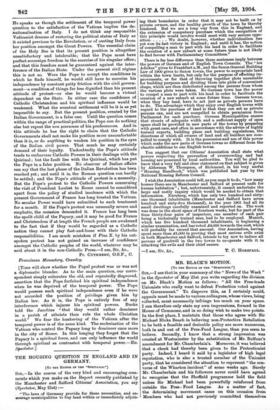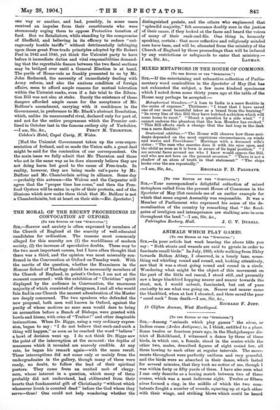[To THE EDITOR OF THE "SPECTATOR.']
SIR,—I see that in your summary of the "News of the Week" in the Spectator of May 21st you write regarding the division on Mr. Black's Motion as follows : "All the Free-trade Unionists who really want to defeat Protection voted against the Government." To disprove this, as I certainly could, appeals must be made to various colleagues, whose views, being collected, must necessarily infringe too much on your space. I can therefore only state my own impressions, formed in the House of Commons, and in so doing wish to make two points. In the first place, I maintain that those who agree with Sir Michael Hicks Beach in believing non-Protective Retaliation to be both a feasible and desirable policy are more numerous, both in and out of the Free-Food League, than you seem to believe. Secondly, I know that a strong impression was created at Westminster by the substitution of Mr. Balfour's amendment for Mr. Chamberlain's. Moreover, it was believed that a check had thereby been given to the Protectionist party. Indeed, I heard it said by a legislator of high legal reputation, who is also a trusted member of the Unionist party, that he considered the situation to represent "the con- verse of the Wharton incident" of some weeks ago. Surely Mr. Chamberlain and his followers never could have agreed to recognise that the Sheffield programme held the field unless Sir Michael had been powerfully reinforced from outside the Free - Food League. As a matter of fact, the determining movement came on this occasion from Members who had not previously committed themselves one way or another, and had, possibly, in some cases received an impulse from their constituents who were strenuously urging them to oppose Protective taxation of food. But we Retaliators, while standing by the compromise of Sheffield, and believing in its efficacy to reduce "out- rageously hostile tariffs" without detrimentally infringing upon those great Free-trade principles adopted by Sir Robert Peel in 1842 and 1846, yet think the Unionist party to have before it immediate duties and vital responsibilities demand- ing that the regrettable fissure between the two fiscal sections may be bridged over until a General Election is at hand. The perils of Home-rule as frankly presented to us by Mr. John Redmond, the necessity of immediately dealing with Army reform, and also the anxious condition of foreign affairs, seem to afford ample reasons for mutual toleration within the Unionist ranks, even if a fair trial to the Educa- tion Bill was not also at stake. Surely the existence of these dangers afforded ample cause for the acceptance of Mr. Balfour's amendment, carrying with it confidence in the Government, in preference to Mr. Black's abstract Resolution, which, unlike its unsuccessful rival, declared only for part of, and not for the entire programme which the Premier out- lined in October last in the famous cutlery city of Yorkshire.
[Had the Unionist Government taken up the over-repre- sentation of Ireland, and so made the Union safe, a great deal might be said for the contention of our correspondent. On the main issue we fully admit that Mr. Thornton and those who act in the same way as he does sincerely believe they are not doing harm but good to the cause of Free-trade. In reality, however, they are being made cat's-paws by Mr. Balfour and Mr. Chamberlain acting in alliance. Some day —probably this autumn—the Walrus and the Carpenter will agree that the "proper time has come," and then the Free. food Oysters will be eaten in spite of their protests, and of the illusions which now make them think that Mr. Balfour is not a Chamberlainite, but at heart on their side.—En. Spectator.]







































 Previous page
Previous page